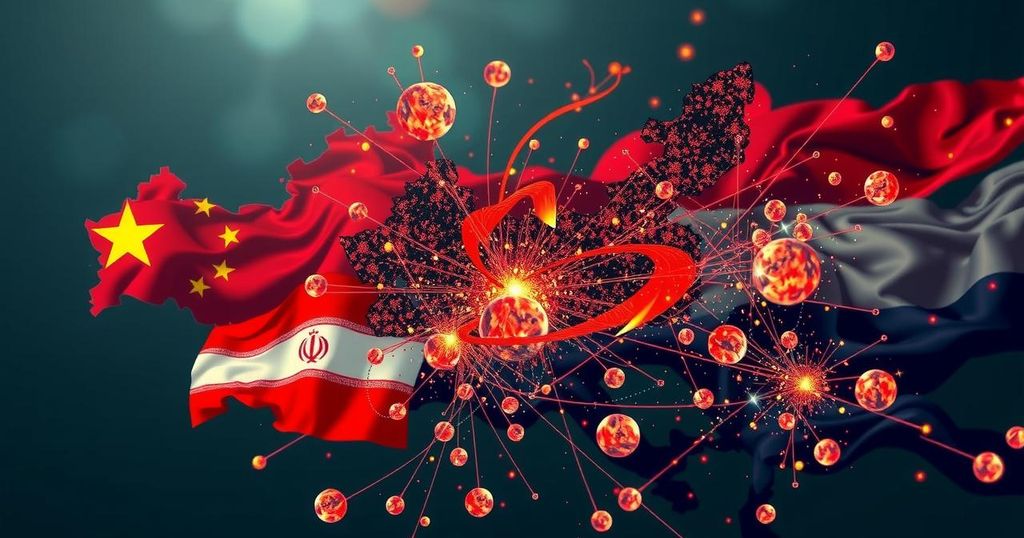Emergence of a New Axis of Evil: A Threat to Global Stability

A coalition described as a new “Axis of Evil” is forming between China, Russia, North Korea, and Iran, raising concerns in Washington. With increasing military and technological cooperation among these nations, U.S. officials warn of a significant threat to global stability. Notably, North Korean troops are assisting Russia in Ukraine, while Iran and China contribute crucial military supplies. Representatives, including Secretary Blinken, have characterized this grouping as revisionist powers challenging the established international order, stressing the pressing need for decisive U.S. action in response.
In recent discussions among U.S. officials, a troubling partnership has emerged among China, Russia, North Korea, and Iran, often referred to as a new “Axis of Evil”. This term evokes historical parallels to the 1930s and reflects rising apprehensions regarding the collective actions of these nations, particularly in light of their recent military cooperation. During a trip to Rome, U.S. Defense Secretary Lloyd Austin confirmed reports of North Korean troops assisting Russia in its ongoing conflict in Ukraine. Meanwhile, Russia has engaged in naval exercises with Iran, and all four nations have actively supported Russia’s military efforts; Iran has supplied drones and missiles, North Korea has contributed artillery shells, and China has delivered dual-use technology and semi-conductors. Republican Congressman Rob Wittman has drawn comparisons to the earlier Axis of Evil, which included countries that aligned against Western principles. Wittman asserted, “We find ourselves at that same crossroads today… nations that do not believe in the rule of law.” In 2002, former President George W. Bush originally coined the term to describe nations perceived as threats due to their support for terrorism, specifically citing North Korea, Iran, and Iraq. However, contemporary discussions broaden this definition to encompass China, Russia, North Korea, and Iran. U.S. Secretary of State Antony Blinken refers to these countries as “revisionist powers”, suggesting a profound competition to reshape international relations. He articulated the need for decisive actions to counter the potential threats posed by these nations. “While these countries are not an axis… choices these revisionist powers are making mean we need to act decisively to prevent that outcome,” Blinken articulated in the publication Foreign Affairs. Wittman highlighted that the contemporary Axis of Evil poses a greater risk of global destabilization than Nazi Germany and its allies due to their technological collaboration. He pointed to the appearance of Chinese components in Russian drones and North Korean artillery used in Ukraine as indications of this cooperation. Merrill Matthews, a resident scholar at the Institute for Policy Innovation, remarked on the expansionist tendencies of three of the four nations involved in this partnership, emphasizing their aim to forge a self-sufficient economic zone independent of Western influence. Christopher S. Chivvis from the Carnegie Endowment for International Peace underscored China’s pivotal role in this coalition, suggesting that without it, the remaining countries would seem isolated. He warned about the potential for crises in one region to engender conflict in another, stating, “A crisis in one region can spill over to another part of the world.” In conclusion, while Blinken characterized the ongoing collaboration among these revisionist nations as “largely transactional”, he acknowledged their shared commitment to undermining the existing international system. This alignment poses significant challenges for the United States and could lead to an increasingly precarious global landscape.
In contemporary geopolitics, the collaboration among China, Russia, North Korea, and Iran has raised alarms within U.S. security circles. Historically termed an “Axis of Evil”, this phrase reflects a coalition of nations united by anti-Western sentiments and divergent ideologies. Recent geopolitical events, particularly Russia’s war in Ukraine, have galvanized these countries to support one another, thereby prompting U.S. officials to label them again as a contemporary ‘Axis of Evil’. Understanding this alliance’s motives and implications is crucial in addressing the growing threats to global stability and U.S. interests.
The emergence of a new alliance among China, Russia, North Korea, and Iran poses a significant geopolitical challenge to the United States and its allies. This coalition exhibits a level of cooperation that reflects their mutual interests in destabilizing the current international order. As they learn and adapt from their experiences in conflicts such as the war in Ukraine, the potential for coordinated actions across multiple regions increases. Therefore, careful monitoring and strategic responses are essential to mitigate the risks associated with this developing partnership.
Original Source: www.voanews.com








